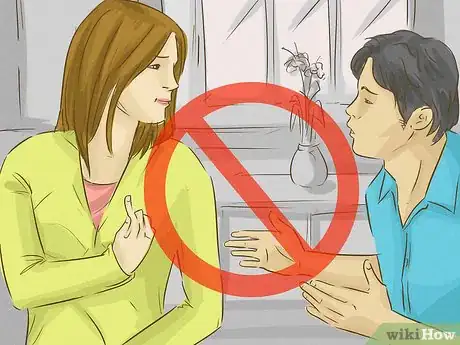This article was co-authored by Lauren Urban, LCSW. Lauren Urban is a licensed psychotherapist in Brooklyn, New York, with over 13 years of therapy experience working with children, families, couples, and individuals. She received her Masters in Social Work from Hunter College in 2006, and specializes in working with the LGBTQIA community and with clients in recovery or considering recovery for drug and alcohol use.
There are 7 references cited in this article, which can be found at the bottom of the page.
This article has been viewed 83,170 times.
Emotional affairs occur when two people get close and intimate on an emotional level instead of a physical one. Though there is no sex involved, they are still considered breaches of trust between you and your partner. To know if your partner is having an emotional affair, notice if your partner is drifting away or has stopped sharing things with you, look for any inappropriate texting or phone calls, and watch for any secretive behavior.
Steps
Recognizing Emotional Distance
-
1Determine if your partner has stopped sharing important thoughts. When in an emotional affair, a person may tell someone else their most important thoughts. This may be their hopes and dreams, their fears, or their successes. They share with the other person and not you.[1]
- Figure out if your partner is sharing things with you like they used to. Ask them questions and see what their responses are, or listen during conversations to what they are saying.
- If you hear your spouse sharing important information with someone else that they have not told you about first, then this can be a red flag since it may mean you are not their go-to person for important matters.
-
2Determine if sex has changed. Though an emotional affair is not physical, the feelings involved in it can cause a physical rift between you and your partner. You may have less sex with your partner than you did before, or the sex may change and become less intimate and more routine.[2]
- For example, your partner may rush through sex, not hold you, barely look at you, and not stick around afterwards.
- Sometimes guilt may cause a person to initiate sex more often, or to lavish you with attention, gifts, or in other ways.
Advertisement -
3Figure out if your partner is pulling away. People in emotional affairs may put distance between themselves and their partners. This occurs because they are worried that they might get caught or say something about the other person. If your partner is pulling away or not talking to you, they may be having an emotional affair.[3]
- Take a look at what your partner does around you. Do they go to bed early, spend time working at night, or no longer want to do things together?
-
4Notice changes in what your partner says to you. When people have emotional affairs, they start talking to the other person instead of you about things. You may start to see differences in what your partner says to you. Maybe they don’t tell you about things you used to talk about often, or you notice they are quieter and share less than they used to.[4]
- For example, your partner might have told you random things about their day, but now they barely talk about their day. This can be a sign of an emotional affair.
- If you find out about things after the fact when you know they are important to your partner may mean they are telling someone else, especially if you know they are close with someone else.
- Changes in your partner’s attitude and tone towards you can also indicate a problem. Consider whether they have started reacting to you with irritation or speaking to you in a condescending tone.
-
5Watch for gaslighting. Gaslighting is an abuse tactic where the abuser tries to convince the victim that their version of reality is inaccurate or even crazy. If your partner frequently tells you that your thoughts are incorrect or crazy and attempts to paint a very different picture than what you are observing, then they may be using gaslighting to deceive you.
- For example, if you hear your partner share some important information with this person that your partner has not yet confided in you yet, then your partner might try to convince you that they already told you this information. This can leave you questioning your memory, even if you are certain that they never told you.
Noticing Signs of Secretive Behavior
-
1Look for any secret interactions with another person. If your partner is having an emotional affair they may not tell you about all their contact with the other person. They may stop being at home as much because they are meeting with the other person.[5]
- You may also notice that they talk on the phone, text, or chat online with people and don’t mention it. If asked, they may evade answering by saying they are talking to “no one,” “a friend,” or “a co-worker.”
-
2Decide if your partner is trying to hide their interaction with the person. If your partner is having an emotional affair, they may start trying to hide their interactions. This might mean they delete call logs or texts, they go somewhere private when they talk on the phone, or they never let you around them and the other person.[6]
- Your partner may not want you to see how they are with the other person because they act differently.
-
3Notice if your partner is dressing differently. Even though emotional affairs are not physical, that doesn’t mean someone in an emotional affair doesn’t want to impress the other person. Often, people in emotional affairs will dress up before seeing the person, wear perfume or cologne, and start changing things to make themselves more attractive.[7]
- Notice if your partner has changed the way they look recently. This could be due to an emotional affair.
- If your partner has started to dress differently to go to work, the gym, or to a business dinner, it could be a sign.
-
4Pay attention to your intuition. Often, you know when something isn’t right in your relationship. This may be the case if your partner is having an emotional affair. If you start to notice a difference in the way your partner talks about someone or you feel like the relationship isn’t just friendship, your intuition may be right.[8]
- If you feel like something is going on, then you want to look for other signs. Don’t go on just your intuition alone, but don’t ignore it either.
- Another red flag to watch out for is if you advise your partner to be careful about developing a close friendship with someone else and they laugh at you or get defensive.
Evaluating Your Partner’s Interactions With The Other Person
-
1Watch for inappropriate behavior or drastic changes in behavior. People who enter into emotional affairs sometimes engage in behavior that can be considered problematic or dramatically different from how they usually act. These behaviors can take various forms. Look for anything that is too intimate or personal between your partner and the other person.[9]
- For example, your partner may text the person often. They may also call the other person. This often happens at night, and may even be done secretly. Look for anything that your partner shouldn’t be doing with someone.
- You may also notice changes in your partner’s behavior such as staying up later, going into work earlier, spending more money, or drinking alcohol more often.
-
2Notice if your partner’s behavior is different around the other person. Emotional affairs often give people an outlet to be different or act differently than they do around their partners. If you have contact with your partner and the person you suspect they are having an affair with, watch their interactions. Look for any differences from the way they act with you.[10]
- For example, your partner may feel emotionally distant from you due to everyday stresses like bills, work, and home responsibilities. With this other person, they may be able to laugh, be relaxed, and be more playful. However, they might also because anxious or uncomfortable when they are around the person in your presence.
-
3Listen to what your partner says about the person. As an emotional affair progresses, your partner may start comparing you to the other person, or they may start to express frustration with things about you that they have never mentioned before. The comments may be random and not meant maliciously, but they may still point to your partner thinking about the other person.[11]
- For example, your partner may say, “They think my jokes are funny,” “They like the same kind of movies I like,” or “They can run at the same pace as me.” Start noting if your partner says things like this and how often.
Addressing the Issue
-
1Talk to your partner. If you think your partner is having an emotional affair, ask them. See if they get defensive, evade, or get upset. If you don't feel comfortable outright asking, you may choose to instead ask questions about the other person.[12]
- Try not to accuse your partner of anything. Instead, say, "I feel you are spending a lot of time with this person. This hurts me because you are my partner, and I feel like we are not as close as we used to be."
-
2Remain calm. During this conversation, you should remain calm. You will not get anywhere if you are both angry. If your partner denies or admits the closeness to this other person, don't yell and get upset. Instead, take a deep breath before responding.[13]
- If your partner denies everything, then take the opportunity to discuss the problem in your relationship, like how you feel emotional distance or feel neglected.
-
3Evaluate your suspicions. You may want to figure out why you believe your partner is doing this in the first place. Have they had an emotional or physical affair before? Have other people noticed your partner's behavior? Is this based on your own issues? Determining this can help you figure out how to proceed.
- Examine your own feelings. Are you jealous by nature? Are you insecure? Have you been cheated on in the past? These things may make you more sensitive and suspicious.
- Talk to your partner about your feelings. Sharing your insecurities or past can help you build a stronger future.
- You may also consider talking with a trustworthy friend or family member about your suspicions. Choose someone who you think would give you objective feedback and who your partner would not feel threatened by you confiding in them. Make sure the person is someone who will not tell other people about what you have shared because this may cause your partner to feel betrayed.
Expert Q&A
-
QuestionWhy do people have emotional affairs?
 Lauren Urban, LCSWLauren Urban is a licensed psychotherapist in Brooklyn, New York, with over 13 years of therapy experience working with children, families, couples, and individuals. She received her Masters in Social Work from Hunter College in 2006, and specializes in working with the LGBTQIA community and with clients in recovery or considering recovery for drug and alcohol use.
Lauren Urban, LCSWLauren Urban is a licensed psychotherapist in Brooklyn, New York, with over 13 years of therapy experience working with children, families, couples, and individuals. She received her Masters in Social Work from Hunter College in 2006, and specializes in working with the LGBTQIA community and with clients in recovery or considering recovery for drug and alcohol use.
Licensed Psychotherapist Emotional affairs often occur when people's needs aren't being met, especially if they feel that their partner isn't there for them. They reach out to someone who will be there for them, and an emotional affair develops.
Emotional affairs often occur when people's needs aren't being met, especially if they feel that their partner isn't there for them. They reach out to someone who will be there for them, and an emotional affair develops.
References
- ↑ http://www.webmd.com/sex-relationships/features/affair-you-dont-know-youre-having?page=2
- ↑ http://www.redbookmag.com/love-sex/relationships/advice/a21442/signs-of-an-emotional-affair/
- ↑ http://www.webmd.com/sex-relationships/features/affair-you-dont-know-youre-having?page=4
- ↑ http://www.redbookmag.com/love-sex/relationships/advice/a21442/signs-of-an-emotional-affair/
- ↑ http://www.oprah.com/omagazine/Emotional-Affairs-Recognizing-and-Coping-With-Emotional-Infidelity
- ↑ https://www.truthaboutdeception.com/community-features/ask-an-expert/questions-by-topic/snooping-and-spying/804-i-think-my-wife-is-having-an-emotional-affair.html
- ↑ http://www.goodtherapy.org/blog/14-signs-you-have-crossed-into-an-emotional-affair-0912157
- ↑ http://www.redbookmag.com/love-sex/relationships/advice/a21442/signs-of-an-emotional-affair/
- ↑ http://www.goodtherapy.org/blog/14-signs-you-have-crossed-into-an-emotional-affair-0912157
- ↑ http://www.redbookmag.com/love-sex/relationships/advice/a21442/signs-of-an-emotional-affair/
- ↑ http://www.redbookmag.com/love-sex/relationships/advice/a21442/signs-of-an-emotional-affair/
- ↑ https://www.poweroftwomarriage.com/info/surviving-an-affair/
- ↑ https://www.poweroftwomarriage.com/info/surviving-an-affair/
About This Article
An emotional affair is when a person invests more emotional energy with someone else than with their partner. If you’re worried that your partner is having an emotional affair, look out for distance and secretiveness to help you know for sure. For example, if your partner has stopped sharing their important thoughts and feelings with you, they may be sharing them with someone else. Another common sign is if you notice your partner pulling away. They may go to bed early or stay late at work because they’re worried they might get caught. You may also notice your partner having secret interactions with someone else. They might try to hide their conversations and meetings with the other person from you. For more advice from our Therapist co-author, like how to confront your partner, read on.










































































